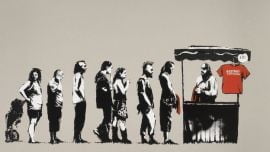We publish here a letter from a comrade in West Yorkshire, who highlights Jeremy Corbyn’s programme for culture and the arts. Rather than simply protecting funding for the arts, socialists should be arguing for a revolution in how art is created, displayed, and distributed – and, in turn, for a revolution in how society is run and organised.
We publish here a letter from a comrade in West Yorkshire, who highlights Jeremy Corbyn’s programme for culture and the arts. Rather than simply protecting funding for the arts, socialists should be arguing for a revolution in how art is created, displayed, and distributed – and, in turn, for a revolution in how society is run and organised.
Dear comrades,
On 11th August, Leeds-based arts magazine State of the Arts published an article by Jeremy Corbyn, in which the left-wing Labour MP set forward the arts policy to be pursued by a Corbyn-led Labour Party. The thrust of the article was opposition to the rabid Tory attacks on the cultural sector, which is having a deleterious effect on the well-established and otherwise thriving cultural sector in Britain. His largely accurate characterisation of the government’s attitude to the arts is reminiscent of Oscar Wilde’s quip: they know the cost of everything and the value of nothing.
Corbyn poses, against the ruthless and cold attacks of the government on the arts, a commitment to investment in the arts which “must be directed to the local initiatives and youth theatres offering so much benefit to their local communities as well as flagship national projects”. He emphasises the need for diversity and open access in the arts, and highlights the success of outreach projects in engaging more young people in the arts.
All of this is to be welcomed. There is no doubt an urgent need to defend the arts from the ‘icy waters of cold calculation’ that characterise every Tory government, but many times more so a Tory government in an era of deep capitalist crisis.
But I don’t think the arts sector should restrict itself merely to self-defence against the cruel logic of capitalist accounting. If anti-austerity politics become – as they must – a concerted counter-attack against the economic system of which austerity is a logical expression, many more and quite radical possibilities open up for the positive development of culture in Britain.
With his commitments to nationalisation of some parts of the economy (such as the railways) on the basis of democratic participation of workers and consumers, Corbyn has already signalled his willingness to make important inroads against the interests of the capitalist class. Given this precedent and Corbyn’s concern for the wildly irrational and inhuman housing situation in this country, these inroads ought also to be extended to the thousands of properties and the millions of acres of land which currently lay idle as mere commodities for trading between capitalists. Taking these resources into public ownership would not only contribute to the elimination of homelessness in Britain, but would also open up new avenues for the free use of space.
If these new spaces were publicly owned and democratically run by bodies with organic links to creative communities and the working class, major new possibilities open up for the engagement of more people in the arts, with the integration of the arts into the collective daily life of British people beyond the endlessly broadcast repetition of corporate-generated pop music and television.
Idle buildings could be used for all kinds of artistic events and exhibitions, or be made available for use by communities of artists to create freely. What’s more, situating centres of artistic production and creativity within working class communities of every kind up and down Britain would ensure diversity of both participants and output. Forms hitherto disadvantaged by a funding regime which privileges more traditional bourgeois forms of the art, such as ballet and opera, could finally experience the direct infrastructural support which will allow them to flourish; forms such as drag performance and hip-hop.
Not only must we be defending established arts organisations from savage cuts. As the movement building around the Corbyn campaign gathers pace and the political discussions it produces proliferate, a direct relation must be identified between making a bold challenge to capitalist property relations and the creation of a vibrant cultural atmosphere in every part of the country.
A veritable revolution in the production and consumption of art is possible – but only if we vow to decisively break with capitalism, with its bottom-line logic of profits, and with its grotesque squandering of human and material wealth.
Owen Walsh, Wakefield CLP






